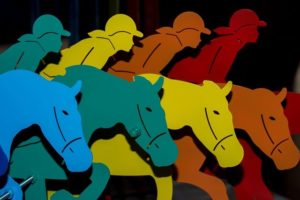According to Timeform Master Ratings, three colts, namely St. Mark’s Basilica (132), Adayar (131) and Baeed (130), were neck-and-neck at the head of the three-year-old division in 2021. The first named was retired to stud after winning the Irish Champion Stakes at Leopardstown in September, following the recurrence of an injury sustained in a freak gallops incident earlier in the season, but the other two reportedly remain in training in 2022.
Hailed by trainer Aidan O’Brien as ‘possibly the best we have ever had in Ballydoyle’, St. Mark’s Basilica was named Cartier Horse of the Year after an unbeaten three-year-old campaign. The half brother to 2,000 Guineas winner Magna Grecia comfortably won the Poule d’Essai des Poulains, a.k.a. the French 2,000 Guineas, on his reappearance at Longchamp in May and took the step up to 1 mile 2½ furlongs in his stride when following up in the Prix du Jockey Club at Chantilly in June. His 3½-length defeat of Addeybb in the Coral-Eclipse at Sandown in July was arguably a career-best effort, but he returned from injury to beat subsequent Prix de l’Arc de Triomphe runner-up Tarnawa in the Irish Champion Stakes.
By contrast, Adayar made a relatively low-key start to 2021, finishing runner-up in both the Classic Trial at Sandown and the Derby Trial at Lingfield. In the Derby itself, he was passed over, not for the first time, by William Buick, but belied odds of 16/1 by keeping on strongly to win by 4½ lengths and 3¼ lengths from Mojo Star and his stable companion Hurricane Lane. The following month, reunited with Buick, he became one of the rare Derby winners to run in, and win, the King George VI and Queen Elizabeth Stakes at Ascot, beating Mishriff by 1¾ lengths.
Owned by Shadwell Estates, following the death of Sheikh Hamdan Al Maktoum in March, and trained by William Haggas, Baaeed did not make his racecourse debut until June, 2021. However, the son of Sea The Stars made spectacular progress throughout the season, winning his first four starts – including the Group 3 Thoroughbred Stakes at Goodwood in July – in impressive fashion. On his first venture into Group 1 company, in the Prix du Moulin de Longchamp, in September, he landed odds of 1/2 with a smooth, 1¼-length success from Order Of Australia. On his sixth and final start of the season, he edged out the outstanding miler of recent years, Palace Pier, in the Queen Elizabeth II Stakes ar Ascot in October to maintain his unbeaten record.
 In November, 2009, the British Horseracing Authority (BHA) introduced a new rule, which forbade jockeys from remounting their horses, upon pain of disqualification, at any point in a race after the field comes ‘under starter’s orders’. There are no exceptions to the rule, which introduced the possibility of races being declared ‘void’ because none of the runners complete the course unscathed. Indeed, that eventuality occurred for the first time in a novices’ chase at Towcester in March, 2011, when all four runners fell or unseated rider.
In November, 2009, the British Horseracing Authority (BHA) introduced a new rule, which forbade jockeys from remounting their horses, upon pain of disqualification, at any point in a race after the field comes ‘under starter’s orders’. There are no exceptions to the rule, which introduced the possibility of races being declared ‘void’ because none of the runners complete the course unscathed. Indeed, that eventuality occurred for the first time in a novices’ chase at Towcester in March, 2011, when all four runners fell or unseated rider.